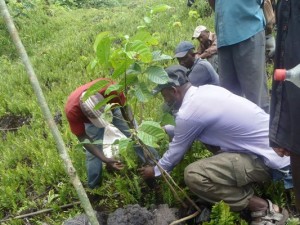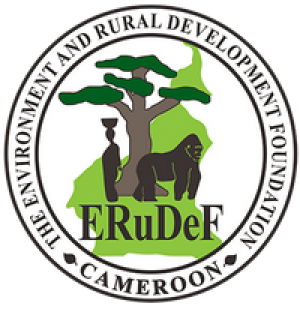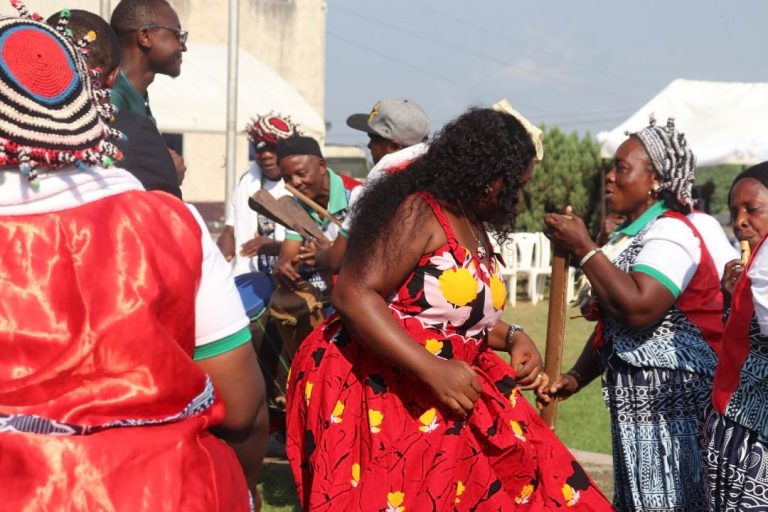[one_third] [/one_third]The Mount Cameroon Region is a biodiversity hotspot with the most diverse ecosystem in Cameroon. It is the 10th most conservable places in the world (IUCN 1994). The area harbors the last near isolated and threatened population of trees in the Southwest region of Cameroon.
[/one_third]The Mount Cameroon Region is a biodiversity hotspot with the most diverse ecosystem in Cameroon. It is the 10th most conservable places in the world (IUCN 1994). The area harbors the last near isolated and threatened population of trees in the Southwest region of Cameroon.
The activities of the surrounding villages affect (directly or indirectly) the management and the resources of the park; about 70% of the area’s population depends solely on the forest for survival. The major threat to the Mt Cameroon Ecosystem is loss of habitat due to logging and conversion of forest to arable land. According to Weidelt, 1996, at least 200 m3 of the Mt. Cameroon forest is damaged by felling every year.
The Environment and Rural Development Foundation (ERuDeF), a local nonprofit organization in collaboration with the South West Regional Delegation of Forestry and Wildlife and the Mount Cameroon National Park service have been working hard to enhance conservation and restore the integrity of the ecosystem. This is within the framework of ‘the conservation of threatened trees of the Mt Cameroon area’ project where trees are raised in nurseries and distributed to adjacent communities to support them regenerate their fragile Community Forests through enrichment planting.
However, these conservation efforts have proven to be futile at the level of maintenance of the species in Community Forests. Out of 16000 threatened trees planted into 3 Community Forests (Woteva Bakingili and Bomana) at the Mt. Cameroon area from 2014-2015, about 7000 have been reported dead due to failure of the village structures to properly manage these resources.
[one_third] [/one_third]This new project seeks to ensure effective regeneration of 3 Community Forests around the Mt. Cameroon National Park with at least 150000seedlings of Microberlinia bisulcata and other highly valued Red list plants within 3 years. The project will carry out aggressive capacity building workshops with at least 30 Village Forest Management Committees (VFMCs) in 3 villages around the Mt. Cameroon National Park on the use of modern techniques (computerized information gathering and use of Global Positioning System [GPS]) and Compass in forest management activities. Training will also be done on transect establishment for tree planting.
[/one_third]This new project seeks to ensure effective regeneration of 3 Community Forests around the Mt. Cameroon National Park with at least 150000seedlings of Microberlinia bisulcata and other highly valued Red list plants within 3 years. The project will carry out aggressive capacity building workshops with at least 30 Village Forest Management Committees (VFMCs) in 3 villages around the Mt. Cameroon National Park on the use of modern techniques (computerized information gathering and use of Global Positioning System [GPS]) and Compass in forest management activities. Training will also be done on transect establishment for tree planting.
The project will also ensure the regeneration of 3 Community Forests with at least 5000 seedlings of Microberlinia bisulcata and other Red list trees within 2 years and guarantee survival of at least 80%. Farmers in the respective communities will be empowered to engage in agro-forestry practices in their farms around the Mt. Cameroon area. This will control encroachment into Community Forests.
By the end of this project, Community Forest Management teams of the various communities will have sufficient Knowledge on forest management activities which will be transferred to the younger generation to guarantee sustainably forest management.
The community members will be able to improve on their livelihood from sales of NTFPs (from country onion and Pygeum) in the short term and quality timber (from Zebra wood, Azobe, Mahogany) from their rich forests in the longer term. Meanwhile, farmers will benefit from agro-forestry techniques and this will improve on soil nutrients and livelihood through sales farm yields and offseason crops. All these will reduce human pressure at the Mt. Cameroon National Park and Forest Reserves.
[one_third] [/one_third]The sum of One million 5000000FCFA is needed to execute this project. (1000000) will support the purchasing of 3 computers, 3Global Positioning System (GPS) and 3 compasses for the training of VFMC and CFM teams. Five hundred thousand francs (500000F) will support training of 30 VFMC/CFM teams in 3 communities on the use of computer and GPS. Nine hundred thousand francs (900000) will support the collection of at least 30000 seeds wildings of the threatened trees listed and successful propagation in nurseries. Nine hundred thousand francs (900000) will support transplanting of at least 15000 mature seedlings into 3 Community Forests. Seven hundred thousand francs (700000) will support the establishment of 6 pilot agro forestry farms in 3 communities. Five hundred thousand francs (500000) will support management of the planted trees in 3 Community Forests. Five hundred thousand (500000) will support evaluation and mapping of points of surviving seedlings in the 3 Community Forests.
[/one_third]The sum of One million 5000000FCFA is needed to execute this project. (1000000) will support the purchasing of 3 computers, 3Global Positioning System (GPS) and 3 compasses for the training of VFMC and CFM teams. Five hundred thousand francs (500000F) will support training of 30 VFMC/CFM teams in 3 communities on the use of computer and GPS. Nine hundred thousand francs (900000) will support the collection of at least 30000 seeds wildings of the threatened trees listed and successful propagation in nurseries. Nine hundred thousand francs (900000) will support transplanting of at least 15000 mature seedlings into 3 Community Forests. Seven hundred thousand francs (700000) will support the establishment of 6 pilot agro forestry farms in 3 communities. Five hundred thousand francs (500000) will support management of the planted trees in 3 Community Forests. Five hundred thousand (500000) will support evaluation and mapping of points of surviving seedlings in the 3 Community Forests.

